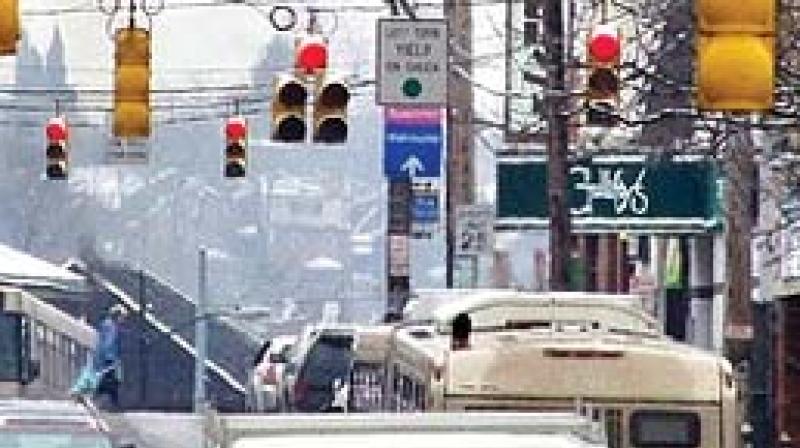No tech, more cops: cruising towards chaos

For a tech city, Bengaluru isn’t so smart. The city’s chaotic traffic is manned by traffic policemen, whose arsenal comprises taking pictures of drivers flouting rules, then catching them at the next signal to collect a fine. The Intelligent Transport System, which was introduced last year at 35 signals, used cameras and sensors to gauge traffic density and prioritise movement in different lanes. It’s too expensive a proposition, however. Despite having too few boots on the ground, traffic cops swarm certain already-crowded junctions where they flag down vehicles and penalise commuters with little regard for the traffic piling up behind them. Technology is our solution but is this fine-collection system too lucrative to give up? Shweta Singh reports
Being caught in a traffic jam is quite the norm in Bengaluru today. With over 70 lakh vehicles taking to the roads now in a city growing more heavily populated by the day, the phenomenon is only to be expected on its narrow roads. With Bengaluru left with no more room for expansion, the heavy volume of vehicles has crippled its traffic, admits Deputy Commissioner of Police, ( Traffic), Anupam Agrawal. "But we deploy 700 to a 1,000 personnel in each division to ensure smooth running of the traffic if the signal lights become dysfunctional, especially in rain,” he says. But clearly this is not helping matters very much as Bengalureans have become used to dealing with chaos on the roads and long waits at traffic signals rain or no rain.
Aware of the mess, the police experimented last year with automated signals that would do away with the need for long and unnecessary waits at junctions. Of the 363 signals in the city, 35 were automated to ease the traffic flow under the first phase of the Bengaluru Traffic Improvement Project (B-TRAC). The ‘Intelligent Traffic Signal System’ installed in places like K.R. Puram, Yelahanka, and Rajajinagar, Vasanth Nagar and Sankey Tank Road involves real time traffic monitoring. The signals are equipped with detectors and cameras to guage the traffic and switch colour accordingly for more efficient traffic flow. The lane with the highest number of vehicles is given preference over those with lesser density, explains Mr Agarwal.
The results were encouraging. The maximum wait time at a traffic signal was cut to 90 seconds and even lesser. But despite the success of the pilot project and the considerable change that it ushered in, the automated signaling is not being extended to more parts of the city, at least for now and the reason appears to be the cost involved. With the pilot costing Rs. 85 crore, the second phase has been put on hold for now. But experts warn that mere installing of the “Intelligent Signal System” may not solve the city’s traffic troubles and believe it's more important to put a cap on the number of vehicles coming out on its roads.
“How can the signaling help if the number of vehicles jumps to a crore in a few years?” they ask pertinently. The traffic police is, however, experimenting with other technology too to improve the conditions on the roads. It installed a radar system at 50 locations across the city two months ago to check speeding vehicles and bring more order on the roads . The solutions may be at hand, but is there the political will to carry them out systematically for the good of the city? Bengalureans can only keep their fingers crossed and their vehicles in top gear as the wait continues.
Random police checks add to chaos
Not so long ago, motorists were wary of being flagged down by the traffic police late evening on the weekends, when checks were done for drunk driving on city roads, but now they find the cops waiting by the roadsides all times of the day to waylay vehicles at random any day of the week. Although former Bengaluru city police commissioner, Praveen Sood had directed the traffic police not to flag down motorists for random checks, the traffic policemen are back at it in areas like Indiranagar 100 feet road, HAL, the Isro junction and Inner Ring Road, where drivers are made to cough up fines, sometimes for very little reason.
Motorists complain the stopping of vehicles merely for checking of documents causes traffic jams and is a harassment. Some allege the traffic cops don’t let them go until they pay a bribe. Others say there have been accidents when motorists have tried to evade the police flagging them down. Observes Mr Sujith K, a software professional, who works in a multinational company near Adugodi, “ You often see three or four traffic cops flagging down vehicles and conducting checks on the Eijipura-Domlur stretch. Such checks of vehicles that are supposedly speeding, can cause accidents as they need to apply their brakes suddenly. Unless a driver is evading the police for an offence, there is no need for such random checks.”
Another driver complains the traffic police wait in the bushes and emerge suddenly to wave down bikers and other drivers only to pocket some money. But ask a senior traffic police officer and he claims the traffic police conduct random checks only during special drives like against drinking and driving. “A directive has already been issued to the officers that unless they find something suspicious, they should not flag down drivers on the roads,” he maintains.

